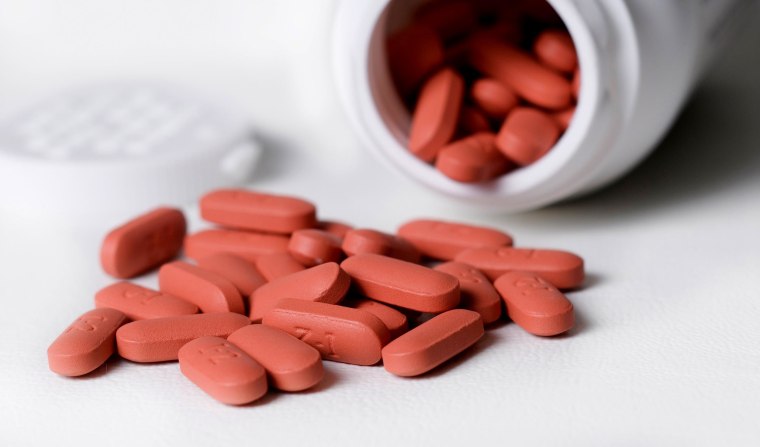A new study comparing three popular arthritis drugs shows they’re all about equally safe -- and equally dangerous for the heart.
It’s good news for people who have to take pills every day for chronic pain, but the drugs are not completely safe. Ibuprofen, naproxen and the prescription drug celecoxib all can cause heart problems, especially when taken long term in high doses.

The findings only apply to people taking high doses over time – they do not apply to people who take ibuprofen or naproxen for fevers, headache or the occasional aches and pains. But even occasional use should be limited, experts say.
“My advice to the public is to take the lowest dose you can for the shortest period you can,” said Dr. Steve Nissen, the heart expert at the Cleveland Clinic who ran the study.
The study was started because of a scandal going back to 2004, when the new arthritis drug Vioxx was pulled from the market when it was shown to cause heart attacks and other heart deaths.
It was a shocker because Vioxx, approved in 1999, was designed to be a more refined version of the drugs in the same class as aspirin and ibuprofen, which both can cause dangerous stomach bleeding.
Since then there has been a bit of suspicion surrounding other so-called COX-2 inhibitors, including celecoxib, sold generically and under the brand name Celebrex.
“We gave everybody a drug to protect the stomach and it happened anyway."
The Food and Drug Administration now mandates a black-box warning on all COX-2 inhibitors and nonsteroidal anti-inflammatory drugs, or NSAIDs, which include aspirin, ibuprofen, naproxen and other over-the-counter pain relievers.
Nissen’s team did a long-term, head-to-head comparison of celecoxib, ibuprofen and naproxen in 24,000 volunteers with rheumatoid arthritis or osteoarthritis for almost three years.
As expected, naproxen and ibuprofen caused some gastric bleeding and celecoxib caused less, Nissen’s team reported in the New England Journal of Medicine and at a meeting of the American Heart Association.
“We gave everybody a drug to protect the stomach and it happened anyway,” Nissen told NBC News. All the patients got a stomach drug called esomeprazole or Nexium.
And all three drugs caused small numbers of heart events such as heart attacks or strokes– 2.3 percent of those assigned to take celecoxib, 2.5 percent of those assigned to take naproxen and 2.7 percent of those given ibuprofen.
The team saw other expected side-effects. “The effect of Celebrex on blood pressure was zero,” Nissen said. “Ibuprofen caused a clear increase in hospitalizations for high blood pressure. Naproxen had intermediate effects.”
“We are not saying that if you take an occasional 200 mg of ibuprofen that you are going to die."
“We’ve known these drugs have heightened risks, and we’ve known ibuprofen is less safe than naproxen,” noted Dr. Alan Taylor, chief of cardiology at Georgetown University, who was not involved in the study. “If your doctor prescribes celecoxib, it’s probably pretty safe.”
The study did not necessarily reflect what happens in real life. Most of the patients – more than two-thirds – dropped out before the end of the trial and more than a quarter did not show up for follow-up visits.
And the patients got extremely high doses of ibuprofen – 600 mg three times a day. The usual dose is 200 mg, or one tablet. The people given naproxen got 375 mg twice and day and those given celecoxib got low doses of 100 mg twice a day.
“We are not saying that if you take an occasional 200 mg of ibuprofen that you are going to die,” Nissen said.
It’s not completely clear why the drugs affect heart attack and stroke rates.
COX-2 inhibitors may increase the risk of heart attacks by raising blood pressure and making the blood more likely to clot, researchers say. COX, or cyclooxygenase, is an enzyme that comes in two forms -- COX-1 and COX-2. Aspirin and other NSAIDS affect both COX-1 and COX-2. The COX-2 inhibitors were meant to be safer by targeting only COX-2.
Nissen believes people who take high doses of ibuprofen, naproxen and other NSAIDs may be bleeding just a little.
“You are losing blood and you gradually trickle down to where you get to an anemic level. And anemia is not good for the heart,” he said.
"One of the most important messages is if you are going to take these drugs, you should take the lowest dose that’s effective for the least possible period of time.”
And people take too much, he added. “The term the FDA uses is dose creep. One of the most important messages is if you are going to take these drugs, you should take the lowest dose that’s effective for the least possible period of time.”
It’s a huge market. Millions of Americans take NSAIDs and COX-2 inhibitors, spending $1 trillion in 2015 for naproxen, ibuprofen and celecoxib.
That’s a big drop from 2014 when it was a $2.8 trillion market. Celecoxib sales also were $2.5 trillion, almost all of them for the brand-name drug Celebrex. Now most sales are for the much cheaper generic form.
